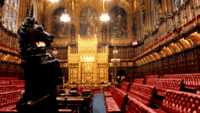
Reform the Lords but never elect it
Matthew Eason believes now is the time for House of Lords reform, however, it would be better off moving to a unicameral system than a fully elected bicameral system.
I do not believe that the House of Lords is currently fit for purpose. I imagine that I am unlikely to be alone in holding this position. Over the past twenty years or so, we have had constitutional reform of our upper chamber every ten years. We may have missed the ten-year mark for reform in 2019, but there were extenuating circumstances and events of greater importance. We are now in the next phase of that process, and so we now have the opportunity and time for the House of Commons to turn its attention to further constitutional changes.
However, much like Sir Lindsay Hoyle's affirmation on transparency last week – I consider the right approach to be a return to a previous conventional approach or idea. Tony Blair's 1999 reforms were a good idea in principle. Unfortunately, they have been twisted into a system of a blatant and crude form of cronyism by every successive government, including his own.
We have moved away from the central principle of the Lords, that of providing expertise and being guarantors of the constitution. Too often, especially during the recent Brexit process, the Lords have displayed a remarkable lack of wisdom in their decisions. It has led to the Lords facing a challenge from the Left, who have never liked the idea of the Lords, and from the Right, who believe that the Lords have lost sight of its purpose.
If it ain't broke, don't fix it. This is a simplistic but not inaccurate explanation of a central plank in conservative ideology. We are clearly past that point. The Lords must change, or it will die in a storm of revolutionary fervour that will create irreconcilable strain for our unwritten constitution.
First, the House of Lords is a bloated institution. If 650 members are too many for the lower, elected chamber then over 800 peers are too many for the unelected upper chamber. In fact, the Lords should have a smaller membership than that of the House of Commons, especially as I think that the appointment system of the upper chamber is beneficial to our bicameral system. It does not make sense for the weaker and unelected chamber to have a larger number of legislators than the more important elected chamber.
Therefore, the first part of any reform to the House of Lords must be a restriction on the maximum number of peers. For me, a suitable number would be, as a start, equivalent to the number of elected members to the Commons but ideally around 400 members. This would demonstrate a real commitment to changing the role of the House of Lords but also to eliminating the disappointing number of Lords who are eligible to vote in divisions and yet choose not to do so. For example, even on a matter of such importance as the EU Withdrawal Bill; the vote on January 21st only had around 470 Lords bothering to participate.
The best way to remove the possibility of nepotism and cronyism from the House of Lords is to remove the opportunities for leaders of political parties to avail themselves of the system. Primarily, this would involve removing ennoblement opportunities from all the honours' lists – be that of the monarch's birthday, for the PM's resignation or any other event – these honours should be limited to knighthoods and the various other potential honours. Additionally, this would not only limit the opportunities for cronyism but also would limit the accession opportunities to the Lords and help keep the membership at a manageable level.
At a more fundamental level, membership of the House of Lords must become widely recognised as fulfilling a duty to your country – to serve through your knowledge – rather than as a reward for political loyalty or a high-profile media presence. As part of this, we must end the practice of pushing freshly unelected politicians into the upper chamber, as that is a flat rejection of democracy and the voters who have chosen to place their trust in different representatives. It is a different question for retiring MPs and those stepping down, but if you are retiring as an MP and frontline politics should you really be seeking to take on the duties that membership of the Lords entails?
As part of the drive to ensure the experience, expertise and constitutional relevance of the Lords we should implement a proper selection process. One possible solution would be to expand the role of the existing House of Lords Appointments Commission. It could take on the responsibility for all appointments, with additional powers to veto all political nominations on the grounds of insufficient expertise.
Moreover, in a system like this, the Commission would share the responsibility of increased powers of dismissal with the Lords Commission for Standards for those who dishonour their position of influence. This could tie in with a new ten-year maximum term limit before there is a mandatory re-adoption process. This would allow for the incorporation of a new reason for dismissal from the Lords; for dereliction of duty, i.e. Lords who do not participate with enough quality and quantity to legislative proceedings would not have their position renewed.
One final change that should be considered is an update to the role of the Lords Spiritual. I think we should enshrine in law the representation of the UK's other major religions; Catholic, Sikh, Islam, Hindu, Judaism and Buddhist. This should take the form of either the official faith leader, where there is one, or a widely accepted senior figure of that religion. However, this should not mean the end of the traditional role of the Church of England, I would not seek to reduce the number of CoE bishops in the Lords due to the UK's heritage and Anglicanism being the state religion.
Despite my belief in the need for Lords reform, there is one route that Lords reform should not go down. It must not become an elected chamber. This would immediately open the question of seniority and put the UK on the road to endless Parliamentary deadlock – of which the suffering of the US Congress is the most prominent example. A change of this nature would require an incredible amount of constitutional legislation and would almost certainly enforce an entirely unhelpful, unnecessary and damaging codification of our constitution. Additionally, there is already a great sense of electoral fatigue in this country. Just imagine how many more Brenda's from Bristol there would be if we had more Westminster elections. We would be better off moving to a unicameral system than a fully elected bicameral system.
I believe that we have now got to the point where we need to take steps to ensure that the House of Lords stays constitutionally relevant. If we do not, the Lords will come to an end and we will lose an important part of our parliamentary tradition and culture.






